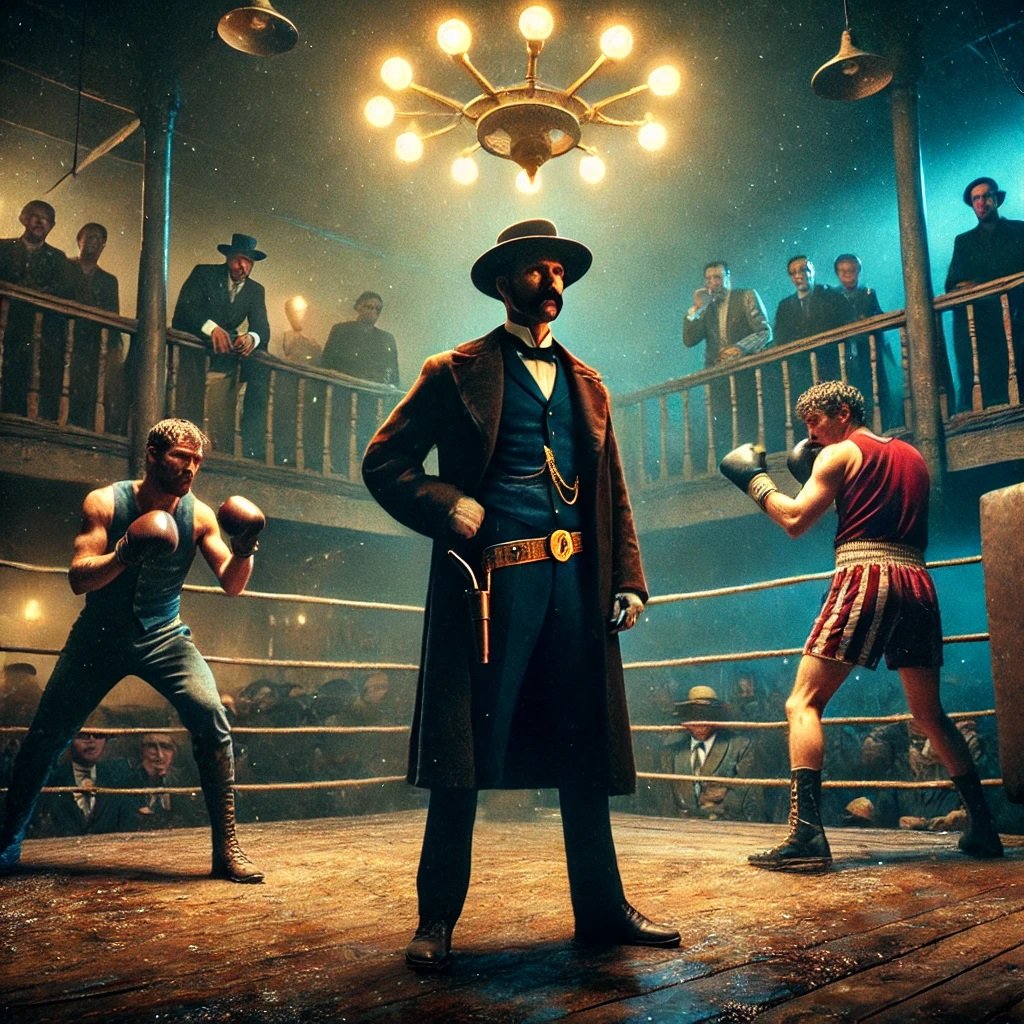From Guns to Gloves: Wyatt Earp’s Ill-Fated Night in the Ring
When Tyson Fury and Oleksandr Usyk meet again in their rematch, it’ll be clear what’s on the line: the right to be called the undisputed heavyweight champion of the world. Sure, boxing being boxing, one of its four major governing bodies won’t acknowledge the winner—citing their current favorite, Daniel Dubois—but for fans, the bigger picture will remain clear. It’s a relatively tidy situation compared to boxing’s early days when chaos ruled the sport, sometimes quite literally. One such moment came in 1896 when a heavyweight title fight found itself tangled up with a legend of the Wild West: Wyatt Earp.
Yes, that Wyatt Earp—the famous lawman and gunslinger of O.K. Corral fame—once tried his hand at refereeing a boxing match. The results were predictably disastrous and turned one of the West’s most iconic figures into the subject of ridicule.
Boxing Meets the Wild West
To understand how Wyatt Earp ended up in a boxing ring, you need a bit of backstory. At the time, the heavyweight championship was as confusing as it was coveted. James J. Corbett, also known as “Gentleman Jim,” defeated John L. Sullivan in 1892 to claim the title. A few years later, Corbett retired, leaving Bob Fitzsimmons as the sport’s recognized champion—until Corbett decided to unretire and claim the title for himself. With this mess as the backdrop, Fitzsimmons prepared to defend his belt against Tom Sharkey in San Francisco on December 2, 1896.
On the morning of the fight, the promoters realized they had a major problem: they didn’t have a referee. Fitzsimmons’ manager, suspicious of potential foul play, had rejected all proposed candidates. Desperate, the promoters turned to Wyatt Earp, then living in San Francisco.
Wyatt Earp: Lawman Turned Referee
By 1896, Wyatt Earp’s reputation was already larger than life. Though not yet the mythical figure he’d become after his death, Earp was well-known for his role in the Gunfight at the O.K. Corral in Tombstone, Arizona, where he and his brothers famously faced off against outlaws. His subsequent vendetta against those who sought revenge on his family only added to his legend.
At the time, Earp was working as a security guard for the powerful Hearst family, publishers of the San Francisco Examiner. The Examiner had recently run a series of glowing stories about Earp, portraying him as a fearless enforcer of law and order. The promoters figured he’d be the perfect man for the job—fair, firm, and immune to corruption.
Initially hesitant, Earp told them to call him if they couldn’t find anyone else. When no one else came forward, Earp showed up just minutes before the fight. The crowd cheered when he entered the Mechanics’ Pavilion, but their excitement quickly turned to unease when they realized Earp, the gunslinger, would be officiating.
Source: When Wyatt Earp was beaten by boxing
A Rocky Start
Earp didn’t exactly inspire confidence when he entered the ring. Beneath his coat, he had a Colt .45 revolver tucked into his waistband—a nod to his Old West roots but hardly appropriate for a boxing match. A police officer quickly confiscated the gun, an embarrassing moment for Earp, who was used to commanding respect.
When the fight began, Fitzsimmons wasted no time establishing his dominance. By the eighth round, it seemed clear he was on his way to victory. Then came the moment that would spark outrage. Fitzsimmons landed a powerful punch to Sharkey’s jaw, followed by another blow that sent Sharkey crumpling to the canvas. Sharkey clutched his groin, and Earp ruled the punch a low blow, disqualifying Fitzsimmons and awarding the fight to Sharkey.
The decision was met with chaos. Fitzsimmons insisted the punch was legal—a clean uppercut to the solar plexus, one of his signature moves. His team accused Earp of bias or outright corruption, claiming the referee had been part of a fix. Sharkey’s camp, meanwhile, argued the punch was below the belt and backed their claim with testimony from doctors who examined Sharkey after the fight.

Fallout and Humiliation
The controversy didn’t end with the fight. Sharkey’s victory was temporarily put on hold while a court investigated the events. Fitzsimmons’ manager argued that Sharkey had been fouling throughout the match and questioned whether the alleged low blow had even occurred. Ultimately, the court upheld Earp’s ruling, and Sharkey was declared the winner.
Earp didn’t come out unscathed, though. The San Francisco Chronicle, a rival to the Examiner, seized the opportunity to ridicule him. They dubbed him the “Tombstone Terror” and accused him of throwing the fight in Sharkey’s favor. Rumors swirled that the Examiner’s publisher had a financial interest in Sharkey’s victory, but there was no concrete evidence to support the claims.
The public humiliation was too much for Earp, who left San Francisco shortly afterward. He headed to Alaska, hoping to strike it rich during the gold rush, but his ventures there were unsuccessful. By the time he returned to California, his reputation as a lawman had been overshadowed by the fiasco in the ring.
Legacy Tarnished
Despite his many exploits in the Wild West—surviving the infamous Vendetta Ride and walking away unscathed from the Gunfight at the O.K. Corral—Earp’s night as a boxing referee became a lasting blemish on his legacy. Even decades later, phrases like “pulling an Earp” or “Earping the job” became shorthand for crooked officiating.
In 1897, Fitzsimmons got a chance to reclaim his honor when he faced James J. Corbett for the heavyweight title. This time, there was no controversy. Fitzsimmons knocked out Corbett in the 14th round with a perfectly executed punch to the solar plexus—a move he insisted had been the same one that ended the fight against Sharkey.
Wyatt Earp attended the Fitzsimmons-Corbett fight as a spectator. No one asked him to referee.
A Legend’s Misstep
Wyatt Earp’s brief foray into boxing serves as a reminder that even the most legendary figures aren’t immune to missteps. For a man who survived shootouts, vendettas, and the chaos of the Old West, it was the organized chaos of the boxing ring that ultimately humbled him. His name may still evoke images of justice and frontier bravery, but for those who know their boxing history, it’s also a cautionary tale about stepping into a world where even a gunslinger’s reputation can’t protect you.
In the end, Wyatt Earp may have conquered the Wild West, but boxing? That was a fight he couldn’t win.
Read More: $765 Million Power Play: How Juan Soto Is Reshaping Baseball with the Mets


